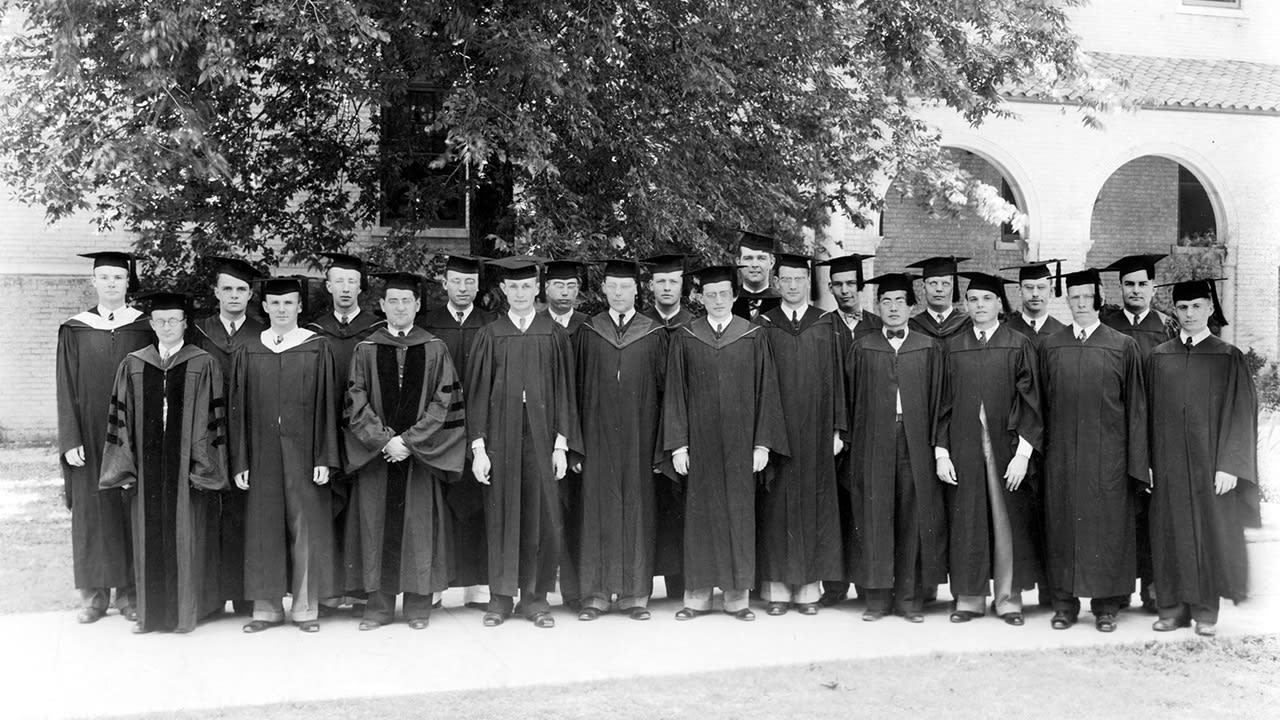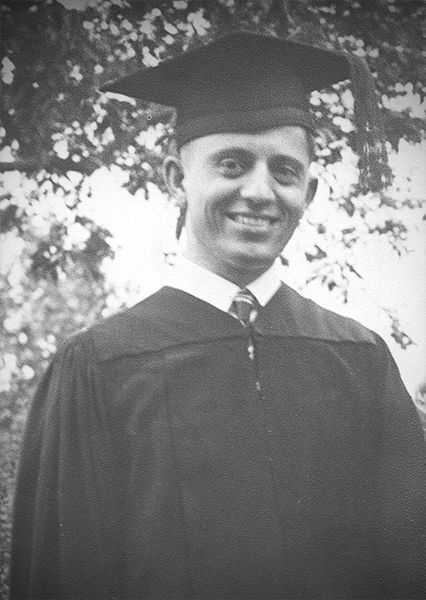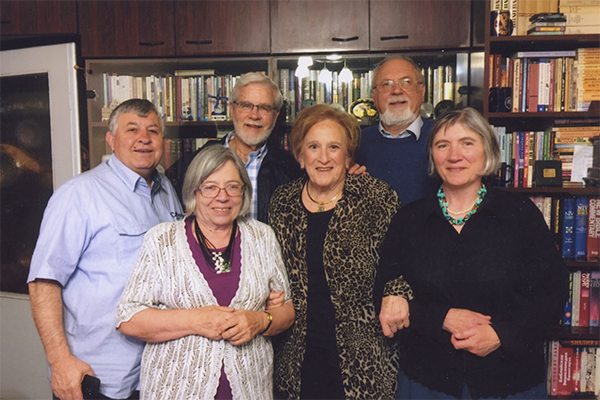A Prayer's Legacy

I don’t remember a day without prayer.
As a young girl growing up, my parents Dr. Rudolf (ThM, 1939) and Dr. Mary Emma Renfer taught me to pray. Over the years my family prayed for many of my father’s classmates from Wheaton College. When he started teaching historical theology at DTS in the late 1940s, he encouraged us to pray for his students on a regular basis, too.
My father also served as an Army chaplain during the 1940s. Wounded after finishing a Sunday battlefield sermon somewhere in Germany (when shrapnel from enemy artillery put him out during WWII), my father returned from the war challenged. He started what was considered the first specific course in chaplaincy training at DTS. He also taught church history and missions and started the annual missions conference. My father—along with my mother—prayed for the soldiers and the people affected by the war. He said, “When a man is dying, he doesn’t give a hang about social betterment. In the last analysis, what he wants is a ministry of conviction and spiritual comfort.
Vassil Angeloff

Vassil at his DTS graduation in 1935
Vassil Angeloff (ThM, 1935) was one of my father’s friends and students. After completing his studies from DTS, Vassil returned home to Bulgaria. At that time the country was considered the most difficult mission field in Europe for many. The danger didn’t dissuade Vassil. He wanted to go back and take the gospel to his people. He wanted to teach the people of Bulgaria the Bible.
In 1941, two years after the irruption of the Second World War, Bulgaria found itself in the war alongside Germany. In September 1944 the Fatherland Front, with the principal positions held by Communists, seized power. Soviet soldiers entered the country, and they did not leave until the end of 1947.
The Communists did not have full control, but by late 1947 they had combined their power. They issued a new constitution at the end of the year. During this period many Christians in Bulgaria still enjoyed some religious freedoms. The church continued to experience growth. From 1946–48, Vassil issued a monthly paper for evangelism. He called it Dobri Vesti (Good News).
The new constitution guaranteed religious freedom. The Marxist régime, however, wanted to limit religion as much as possible. Its 1949 Law of Religious Denominations placed the churches under the control of the Committee for Religious Affairs. Now required, the committee approved the registration of all religious organizations, and they regulated the appointment of church leaders. They determined all foreign relations of religious bodies and publications.
Persecution
In 1948, the régime forced Vassil to stop publishing Dobri Vesti. They eliminated the right to publish any periodicals, books, or hymnals and only permitted the printing of a religious calendar with Bible verses. It was illegal to hold Sunday schools, youth groups, and women’s Bible studies. Christians could not hold any meetings in private homes, and the authorities forbade visitors to speak during Sunday services. In an attempt to intimidate church leaders, the régime imprisoned many of them. They charged them with espionage and all sorts of other false accusations.
The secret police also put pressure on leaders in the Bulgarian churches to denounce each other. Churches faced loss of leadership and isolation from each other. Government pressures and lack of literature and opportunity for theological training proved strenuous. It is not surprising that by the mid-1960s the number of Christians in Bulgaria decreased. Church growth declined. Fear swept over the churches.
During this time, especially in the mid-1960s, Vassil Angeloff and his ministry never did leave my thoughts. His name would cross my mind on a regular basis. On one occasion, I discussed it with my mother over the telephone. She informed me the Holy Spirit was convicting me to pray. So I did. I prayed for a person I only knew through the occasional information my parents had received.
Dr. Ed Matson—another one of my father’s Wheaton classmates—visited Vassil in the mid-1960s. The persecution (now more severe) meant danger for many to associate with a foreigner. So they met on a bridge in Sofia, and they spoke for about half an hour. When I asked Dr. Matson about his trip, he shared the details with me. He mentioned his visit with Vassil had to remain short and in secret.
As he gave me the details of his meetings, I looked at Dr. Matson with amazement. I found out their time on the bridge coincided with my conviction to pray. Dr. Matson visited Vassil within the months the Holy Spirit had laid the Angeloff family on my mind. The Lord impressed upon me for the need and the power of prayer in a phenomenal way.
Spiritual Growth
In spite of the affliction and their discouraging situation, the Bulgarian church survived. The persecution and restrictions helped produce a dedicated corps of believers. Before his death in 1972, Vassil assisted many of his fellow pastors by sending them typed sermons. His desire to teach the good news never left him. The church also had a faithful constituency of women who provided much support for many. Churches continued to help young people. Some received good educations despite their circumstances.
In 1980 the régime imposed a state-appointed pastor on the Sofia Church in an attempt to subvert it. Members met in houses and many even considered going underground. But God heard my prayers—our prayers—and political change reached Bulgaria. In November 1989, Todor Zhivkov, the president of Bulgaria, resigned. The sudden move to democracy gave Christians in Vassil’s homeland religious freedom. They could now hold Sunday schools, youth groups, and women’s Bible studies. They could now preach without restrictions, meet together, and travel.
The Sofia Church replaced its state-appointed pastor with Nikolai Nedelchev, Vassil’s son-in-law. Soon after, Nikolai launched an aggressive evangelistic program. The church sent teams to take the gospel to the gypsies and reopened a church in Berkovista.
Ministry of Conviction
In November 2015 I took a bold step. For many years I had desired to visit the church Vassil pastored—I wanted to find some of his family. After all, my commitment to pray for him and his family endured over many years. With the help of the internet, I researched about Vassil’s work and read about his life and ministry in Bulgaria.
To my surprise, I found an email address on a site. I immediately sent a note to the current pastor of the church Vassil had led in Bulgaria many years ago. Ten minutes later, the pastor sent me information. He informed me about the dedication of a new church in the area.
He also told me about Vassil’s two daughters, Grace Nedelchev and Betty Papratilov. The pastor then forwarded my note to them, and three hours later, I had a long, long email from Grace. The next day, I received another email—this time it was from Betty.
Last May, I had the precious privilege of spending time with Vassil’s two daughters. Along with them, I visited with their husbands and children. Wanting more information about their father’s time in America, both ladies had researched, too. What they learned about his days at DTS did not surprise any of us.
Many times, I’ve seen the transformative power of prayer within the lives of my loved ones. Sometimes, I don’t get to see it first hand, but I experience the fruit of what it means to commit others to prayer. That’s what happened last May when I visited Vassil’s daughter’s and their families.
What started with prayers in the 1940s throughout the 1960s culminated with a meeting of the next generation from our parents’ friendship. Our hearts blended as we shared stories. We found unity through my prayer journey for Vassil and my search to find my family’s beloved friend had now come full circle.
Spiritual Comfort
My prayers for this family didn’t stop with Vassil’s life. In fact, God answered my prayers and extended it beyond his life. Vassil had two great dreams about Bulgaria: Training the believers through Bible courses and producing sound Christian literature so that every family in Bulgaria will have Bible and good Christian books. With the coming of democracy, both of his dreams came true. With his daughters, his legacy lives on.
Grace, a retired physician, works with a Bible training program for women. Grace’s husband, Nick Nedelchev, became president of Logos Bible School and serves as president of the Bulgarian Evangelical Alliance. Betty works as a translator. Her husband, Roumen Papratilov, became a manager of New Man Publishing House. In fact, their family (including their adult children) work together at New Man. It is the largest Christian publishing company in Bulgaria today.
When I visited the new church, the pastor asked me to share the story of my prayer journey and how it brought me to Bulgaria. I told the congregation it all began with my family praying—a simple petition for a friend from this far-away country. I shared with them how my prayers continued as I grew into an adult and how now I stood before them in this marvelous reunion as a result of many prayers.
My emphasis stayed on the power of prayer that day. I focused on the impact prayer has, and how families need to remain diligent in praying together. I also gave thanks to the Lord for his leading in this journey.
Soon after, we praised God together for the special bond we have when God’s people pray for each other. We sat around contemplating the reunion going on in heaven. For we know it is as precious for our parents. And then we prayed—we prayed for those in ministry and for the many who face restrictions and persecutions today. We prayed and gave God thanks for the hope we have in Jesus. And we encouraged each other to continue to pray—as our parents had done so many years ago.

May 2016 – Nancy had the privilege of spending time with Vassil Angeloff’s two daughters, Grace and Nick Nedelchev, and Betty and Roumen Papratilov
About the Contributors

Nancy Renfer Sturges

